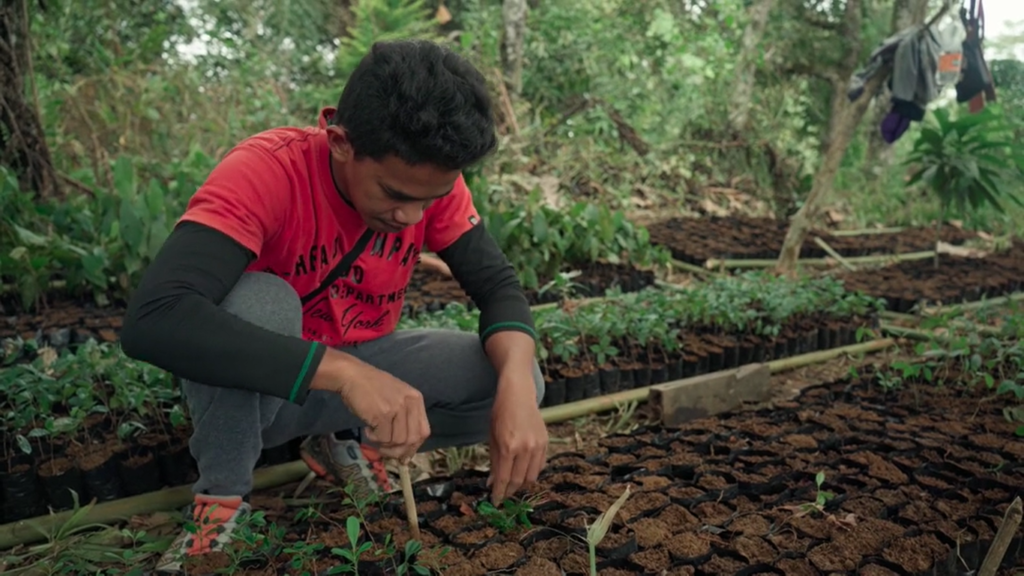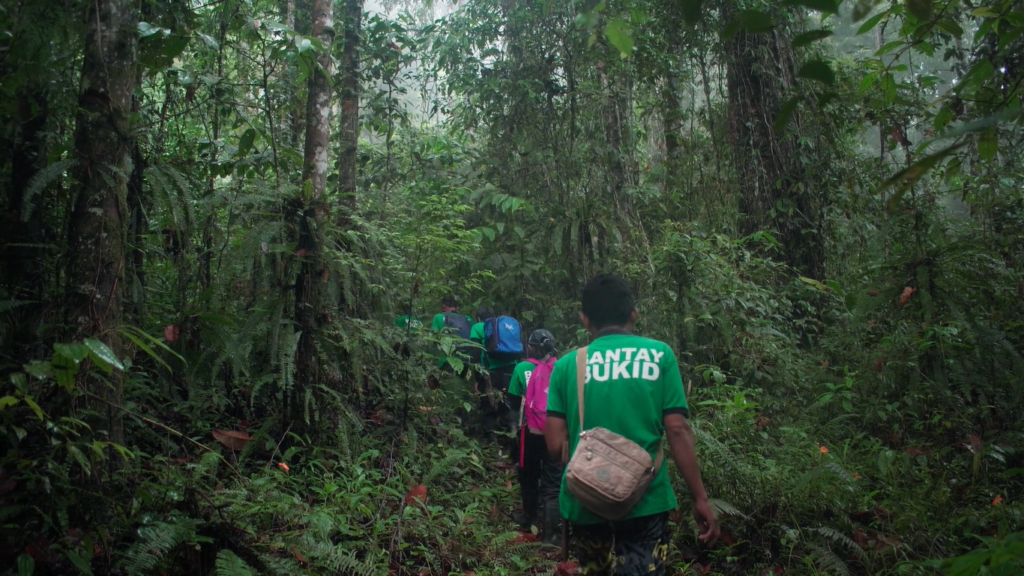Forest guards patrol Mount Apo—a critical water source for Mindanao—protecting it from illegal activities with meager pay and little institutional support. Known as Bantay Bukid, the forest guards survive on P3,500 per month and makeshift equipment as they contend with illegal activities from established businesses.
“Forest guarding is our last card. If our group won’t be supported, our home forests will be gone,” a Bantay Bukid member said.
Safeguarding the forests
The Bantay Bukid protects Mount Apo Natural Park, which spans 65,900 hectares, preventing threats such as illegal logging operations and land grabbing activities.
Captured for the first time on camera, the forest guards spotted illegal loggers in Calinan, Davao City. They approached unarmed and without protective gear, prioritizing dialogue over threat or intimidation.
“They always told me that violence leads to more violence,” recounted Pia Duran, director of the Bantay Bukid (Forest Guards) documentary film chronicling their work.
The forest guards apprehended the loggers and turned them over to barangay officials, but the damage was already done. Trees fell to a chainsaw, including a Lauan tree, the nesting tree of the critically endangered Philippine eagle and that provides flood protection.
Still from the Bantay Bukid (Forest Guards) documentary film
“When there are illegal activities in the community, authorized government agencies are slow to respond,” said tribal chieftain Matanam Hernan. “We’ve filed cases before, however, we lack funds to push for them… We need to pay for the filing fee and then the lawyer’s fee because the Department of Environment and Natural Resources (DENR) doesn’t have a lawyer for us.”
Despite the dangerous nature of their work, Bantay Bukid receive honorariums of just P3,500 monthly, far below minimum wage standards.
“We can’t consider that as a salary… it’s an incentive,” one forest guard explained, driving many to supplement income with subsistence farming and other jobs.
Rain or shine, the Bantay Bukid begin their patrols at 5 a.m. and work until nightfall. To protect themselves, they often split into groups—removing wildlife traps, conducting reforestation efforts, and locating Philippine Eagle nests.
Forest guards operate with minimal equipment. Many lack proper boots, raincoats, or GPS devices and walk dozens of kilometers during foot patrols. During intensive operations, guards stay in the forest for three to five days at a time before returning to their families.
Still from the Bantay Bukid (Forest Guards) documentary film
Meanwhile, DENR (Department of Environment and Natural Resources) officials faced criticism for issuing cutting permits in Mount Apo, a conservation area identified by the Watershed Code and a nesting site of the critically endangered Philippine Eagles.
It was only recently, in April this year, that a resolution was passed requiring the DENR to secure a zoning compatibility certification for all tree-cutting permit applications.
Most people recognize Mount Apo for being the tallest mountain in the Philippines, but there’s more to the mountain than meets the eye.
It functions as a watershed providing water for 1.7 million Davao City residents and biodiversity hotspot sheltering over 800 plant species and 272 bird species. It is also regarded as ancestral land for indigenous communities.
The National Commission for Indigenous Peoples has been criticized for dragging its feet when it comes to supporting Bantay Bukid. In an inter-agency visit, a representative admitted that they don’t have funds to train forest guards and that they must protect their land themselves.
Around 90% of Bantay Bukid at Mount Apo are from indigenous groups, namely the tribes of Bagobo Klata, Obu Manuvu, Bagobo Tagabawa, and Manobo-Tinun-anon.
Still from the Bantay Bukid (Forest Guards) documentary film
A country-wide issue
Forest guards and environmental defenders across the Philippines face the same fundamental challenges. Compensation and budgetary allocations fluctuate, with many still operating on a volunteer basis. For the Bantay Bukid alone, it took five years before they received monthly allowances from the city.
Many forest guards rely on NGO partnerships and community governance systems for support. The Philippine Eagle Foundation, for instance, launched a crowdfunding campaign to provide the Bantay Bukid in Mount Apo with personal protective equipment. At Ulot Watershed Model Forest, a $6,000 grant from the International Model Forest Network created additional income opportunities through sustainable pili tree management.
Still, the lack of institutional support leaves forest guards vulnerable to threats and violence. For the 11th consecutive year, the Philippines remains Asia’s deadliest country for environmental defenders according to Global Witness. Almost 300 environmental defenders have been killed since 2012, with indigenous peoples accounting for one-third of the victims.
Beyond lethal attacks, defenders nationwide face abductions, trumped-up charges, smear campaigns, criminalization, and intimidation tactics.
“Many people don’t realize that conservation work can be dangerous,” explained Duran. “Our forest guards have been threatened and their families intimidated. Some have received death threats for simply doing their job.”
Still from the Bantay Bukid (Forest Guards) documentary film
The legal framework protecting these environmental defenders remains inadequate. The Indigenous Peoples’ Rights Act theoretically supports their role in managing ancestral domains, but implementation gaps and conflicting land classifications often undermine these protections.
These challenges reflect broader patterns across developing nations. At the International Model Forest Network 2025 Conference, forest management experts noted that marginalized communities are often left behind in conservation planning, with their local knowledge overlooked even when they participate in discussions.
“Our advocacy is that hopefully in the future our government and the country will recognize that forest guarding is legitimate work,” said Jayson Ibañez, Director of Operations at the Philippine Eagle Foundation.
Leaving a good legacy
There are multiple layers of support needed for forest guards and other environmental defenders. The first is raising awareness about their importance.
“In the Philippines, it’s not yet a mainstream conversation,” Duran observed.
Despite their role in conservation, forest guards remain virtually invisible. In her travels, Duran frequently encountered people who were completely unaware that forest guards exist in the Philippines.
Through screenings at schools, cinemas, and community centers, the documentary is now sparking crucial conversations. Young viewers often expressed profound interest in volunteering or supporting conservation efforts after watching the film.
The second layer is direct community support.
Current reforestation initiatives include 3 million trees for the Klata community and 1 million trees for the Tagabawa community. Forest guards plant endemic seeds in a nursery, transport them to the forest, and strategically plant them near rivers to prevent flooding and enhance biodiversity.
“We can fund a seedling or donate a seedling for the forest guards,” Duran shared, adding that the money will go to funding their operations and sustenance for the laborious fieldwork.
 Still from the Bantay Bukid (Forest Guards) documentary film
Still from the Bantay Bukid (Forest Guards) documentary film
Direct support also extends to livelihood programs focused on cacao and coffee cultivation. Mount Apo produces high-quality coffee beans that connect forest guards to specialty coffee markets, while Davao City’s status as a major cacao exporter provides additional opportunities for sustainable income generation.
The most challenging layer is policy change.
“Policy change is one of the most difficult things to lobby,” Duran acknowledged.
The process involves building a coalition and finding champions in Congress and local councils who recognize the importance of the environment and are willing to advocate for institutional support systems. Bohol’s Carood Watershed and Apayao’s Bayugao Tribe, for instance, offer insights on improving government engagement and funding.
Advocates are currently working on getting Mount Apo’s forest guards access to decent wages, health insurance, and social security benefits. The Bantay Bukid does not have PhilHealth and SSS coverage despite the dangers they face daily.
There is also a plan to scale this initiative through national policy.
–
To support Bantay Bukid, please visit bantaybukidfilm.com or contact film director, Pia Duran, at piaduranph@gmail.com.

